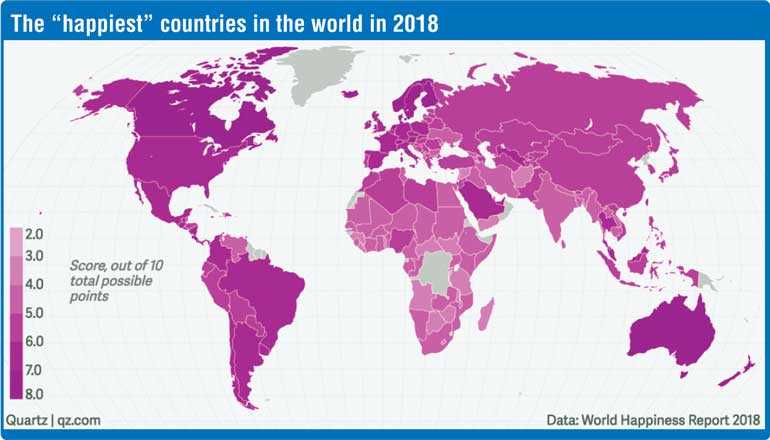Monday Feb 23, 2026
Monday Feb 23, 2026
Friday, 18 January 2019 00:00 - - {{hitsCtrl.values.hits}}


In an age of stark contradictions, we live in a world where the exclusive 1% enjoy access to an abundance of wealth and resources but also a world where a billion people scarcely have enough to eat and have limited access to health and education. While economic progress of the elitist countries is thus conventionally measured in numbers, its population slowly succumbs to obesity, smoking, stress and depression. 
Great sages and philosophers like Aristotle and Lord Buddha taught humanity time and time again that material needs may not always fulfil our greatest desires but more over to promote the end of suffering, achieve social justice and attain happiness.
Money isn’t everything, but for measuring national success it has been everything
When the World Bank forecasted Gross Domestic Product (GDP) growth in Sri Lanka to touch 4.1%, it made me wonder, is there a better model to measure growth? Does the Sri Lankan story reflect the true nature of a mere number or can there possibly be more to it?
GDP has prevailed as a metric to measure growth of a country since World War II, certainly a better metric that military victories which were its preceding time-honoured gauge. With so much innovation, disruption and exponential change spiralling out of control, are we trying to measure the state of a 2019 economy with a 1940s method, GDP?
What does GDP tell us?
What GDP tells us is whether the economy is going faster or slower, very similar to that of a speedometer. Just like in cars, while this information is critical, it fails to tell us some very important things that we want to know. For example, it won’t tell us if we are overheating, or about to run out of fuel.
The speedometer won’t tell us if we are steering in the right direction, typically if we ask the driver if the direction is right, his natural tendency is to justify his route and accelerate. The exact same thing happens when complaints are raised about the current state of the economy resulting in a strong commitment to spur growth by its decision makers with little regard for direction or other critical indicators.
The elusive economic compass
Direction is established through the proverbial economic compass that calls for the views of its citizenry. Asked from the people, a good economy would meet the basic needs towards achieving happiness, health and maintaining the quality of life, free from inequality and injustice.
The challenge would now be to identify the economic equivalent of this compass which will provide direction of economic travel.
The error of measurement
Even though GDP measures the cost of goods and services bought and sold, the value of housework, health and recreation are not represented. For instance, imputed rent, how much we would pay for our own home is not included as are so many other factors. How about the revenues from the drug trade or prostitution?
The manner in which we eat into our endowments, cutting forests, scavenging the oceans, polluting the environment raises concerns on introducing a green GDP as these components fail to be included in the GDP calculation, conveniently and perhaps comically.
We also cannot overlook the technological advancement that is hardly factored into the goods and services. For instance, the price indices do not adequately capture the large memory capacities, faster speeds, better cameras and multi-faceted options of the mobile phones. Where in GDP do we capture these significant contributors?
Even though things of value cannot be captured comprehensively through GDP they can be measured by separate metrics such as health, education and freedom. It may very well boil down to a case of measuring commodities vs. capabilities as distinguished by Amartya Sen in the 1980s.
The science of happiness
Widely acknowledged and highly recommended irrespective of country, happiness is a common indicator and probably the most accurate denominator of establishing social well-being. These are things that dominate our daily lives everywhere; the things that we care about and which we think we have some ability to control. It means that comparisons among groups of people are possible. Perhaps a metric of relevance across all socio-economic dimensions?
The link to sustainable development
As the caretakers of earth it is our duty to protect the Earth by adopting lifestyles and technologies that improve happiness and finally life satisfaction while simultaneously reducing human carnage to the environment.
The phrase “Sustainable Development” talks of a combination of human well-being, social inclusion, and environmental sustainability. Hence, it is safe to assume that the quest for happiness is intimately linked to the quest for this so called sustainable development.
Measuring a smile
Statistics are not facts; they are tools. Hope for a better measurement is emerging as we speak in the Social Progress Index (SPI) which involves a holistic framework as we strive towards inclusive growth. Environmental impact assessment tools such as ecological foot printing while environmental profit and loss have been trialled in our quest to reach triple bottom line profitability.
The World Happiness Report which is gaining in importance uses a mix of GDP, social support, healthy life expectancy, freedom to make life choices, generosity and perceptions of corruption to rank countries. The way forward is in fact a mix of subjective and objective measures.
The responsibility is in our hands not to make decisions purely based on the financial information but rather to account for social and environmental capital. A world of win-win-win. Even though it has been thus established that Money can’t buy happiness, it could perhaps buy the ability to measure it.
(The writer is a Fund Manager and banking professional with over 10 years of experience in in capital markets advisory, investment banking, portfolio management and corporate finance and holds Masters Degrees in Finance and Management Strategy.)
References:
https://www.weforum.org/agenda/2016/04/the-science-of-happiness-can-trump-gdp-as-a-guide-for-policy
https://www.techvshuman.com/2016/08/15/gross-domestic-product-vs-gross-national-happiness-gdp-vs-gnh/
http://theconversation.com/how-happiness-is-challenging-gdp-as-the-measure-of-a-countrys-health-56465